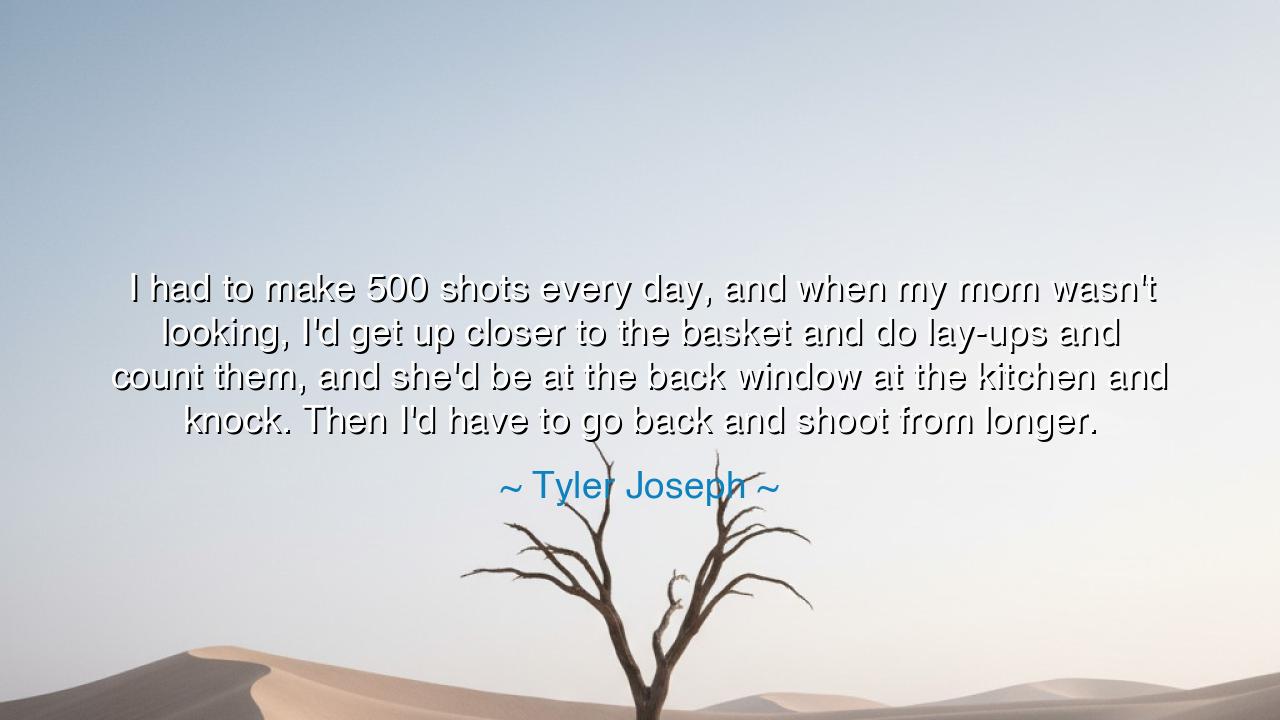
I had to make 500 shots every day, and when my mom wasn't
I had to make 500 shots every day, and when my mom wasn't looking, I'd get up closer to the basket and do lay-ups and count them, and she'd be at the back window at the kitchen and knock. Then I'd have to go back and shoot from longer.






“I had to make 500 shots every day, and when my mom wasn’t looking, I’d get up closer to the basket and do lay-ups and count them, and she’d be at the back window at the kitchen and knock. Then I’d have to go back and shoot from longer.” — Tyler Joseph
In this vivid and tender recollection, Tyler Joseph, the lead vocalist of Twenty One Pilots, paints a picture that is both humorous and profound — a story not only about discipline, but about the unyielding love and vigilance of a mother’s guidance. Beneath the image of a boy sneaking closer to the basket lies an ancient truth: that growth requires both effort and correction, both the freedom to fail and the wisdom of one who watches. His mother, knocking on the window, is not simply a parent ensuring rules are followed — she is the eternal symbol of accountability, the guardian who demands greatness from love, not control.
The origin of this quote rests in the world of practice — the endless repetitions, the unseen hours that forge mastery. To make “500 shots every day” is not merely to train the body, but to train the mind — to cultivate the patience, consistency, and will that form the foundation of excellence. Yet even the most disciplined heart is tempted to take shortcuts, to seek comfort over challenge. Tyler’s boyhood self, counting lay-ups as long-distance shots, reflects this universal human tendency — the desire to achieve much while exerting little. But then comes the mother’s knock, the soft sound of truth calling the child back to honesty. In that moment, discipline becomes a shared ritual — the making of character, not just skill.
The ancients would have understood this scene well. To them, discipline was sacred — the path by which mortal beings approached the divine. The Greeks spoke of arete, the excellence of soul that comes through habit and struggle. The Spartans trained their youth not for comfort but for courage, believing that to do what is hard shapes what is immortal. And always, there was a guide — a mentor, a master, a parent — who demanded honesty when ease tempted the spirit. Tyler’s mother, standing behind the kitchen window, is one of these eternal figures — the watchful eye of love that refuses to let the soul grow soft. Her knock, light yet firm, is like the voice of conscience itself, calling him back to the true measure of effort.
There is also something deeply symbolic in the distance of the shot. To move closer to the basket is to seek safety, to avoid risk; to step back is to face uncertainty, to test one’s reach. Life, like sport, demands that we step back — that we try from farther away, where success is less certain but growth is greater. The mother’s knock, then, becomes an act of faith — her belief that her son is capable of more than he thinks. Her correction is not punishment; it is prophecy. She sees not the boy before her, but the man he might become, and she insists that he meet his future halfway.
History offers many echoes of this truth. Consider Michelangelo, who as a young apprentice was chastised by his master for leaving details unfinished on a sculpture. “Trifles make perfection,” the master said, “and perfection is no trifle.” Like Tyler’s mother at the window, that mentor saw what the student could not — that greatness lives in the details, in the discipline to do even the unseen things with care. Every artist, athlete, and thinker who has reached excellence has had such a figure behind them — the one who knocks when they draw too close, who insists they stretch further.
Yet there is tenderness in this story as well — a reminder that discipline without love is tyranny, but love without discipline is ruin. Tyler’s memory is not one of resentment but of reverence. In his mother’s persistence, he found not oppression but guidance; not control, but care. She demanded effort because she believed in his potential. The ancients would call this philia, the love that seeks the good of the other. It is the love of a teacher for the student, of a gardener for the seed — the love that knows the flower must first push through soil and strain toward light before it blooms.
Let this, then, be the lesson: do not fear the knock at the window. It may come from a parent, a mentor, a friend, or the whisper of your own conscience — the reminder that you are capable of more. Do not curse it; thank it. For the knock means someone sees your greatness, even when you try to hide it behind easy victories. Step back from the basket. Take the harder shot. Miss, try again, and grow.
For as the ancients said, “The gods give nothing to the idle.” True excellence is not born of ease but of endurance — and behind every great soul stands one who refused to let them settle for less. Tyler Joseph’s mother, standing at her window, reminds us that love is not always gentle — sometimes it is the firm hand that pushes us toward the work we were born to do. And in the end, it is that steady knock — the sound of love demanding truth — that shapes the heroes of every age.






AAdministratorAdministrator
Welcome, honored guests. Please leave a comment, we will respond soon